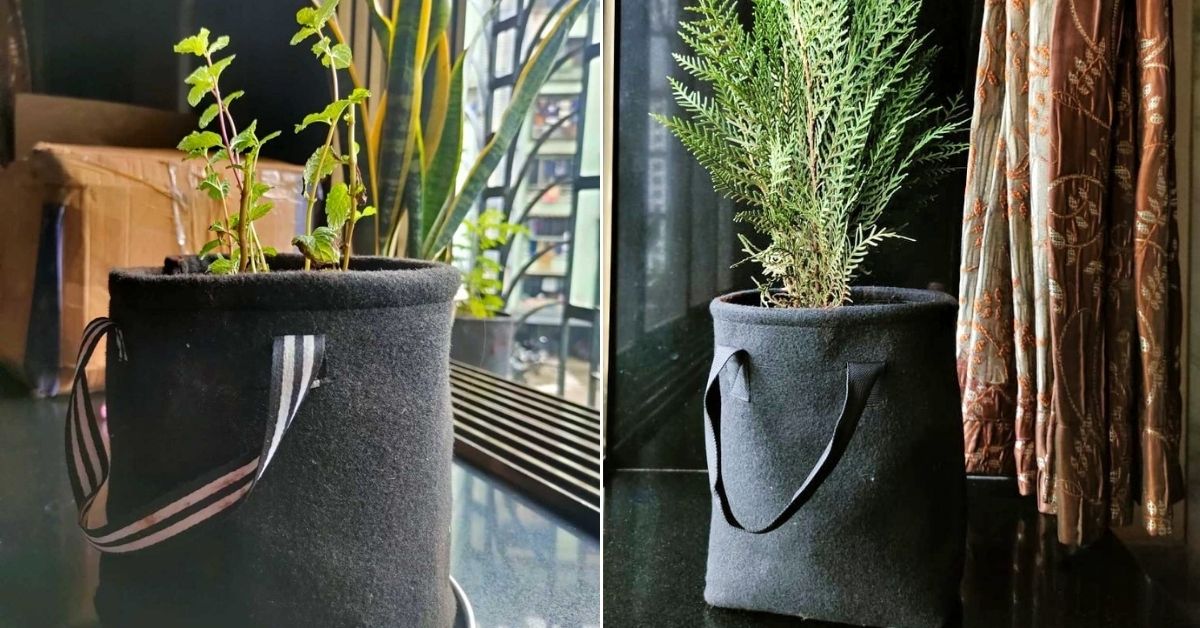The mantra that most urban home gardeners live by is “reuse and recycle”. For that reason, most use discarded drums, refrigerators, and several other household items to grow their plants. However, these can add extra weight to a building’s structure or could occupy a lot of space.
As an eco-conscious solution, 17-year-old Jinay Gada, a resident of Mumbai, has made lightweight grow bags from non-woven fabric. In July 2021, he launched ‘Planteria’ and began marketing these grow bags across India.
“The grow bags are made of non-woven fabric extracted from plastic bottles and covers. They are sturdy, regulate water drainage, and promote air pruning. To date, I have sold 200 bags through social media,” says Jinay in an interview with The Better India.

A sustainable choice
When the first lockdown was announced back in March 2020, Jinay, a student of K J Somaiya College of Science and Commerce, began gardening at home.
He grew various flowering plants like roses, some plants from cuttings like money plants, and even tried growing fruits and vegetables. However, when he wanted to purchase lightweight planters for his balcony, they were either made of all-plastic or were too expensive.
“So I took matters into my own hands and decided to make my own grow bags. I wanted them to be lightweight and in line with the urban gardener’s mantra — reuse and recycle,” says Jinay.
After researching a bit, he understood that grow bags were also made using fabric. Soon he purchased a few on a trial basis.
“However, the first few pieces I bought were either too flimsy or had other issues like improper water drainage or they did not promote root growth,” says Jinay, adding that he decided to stitch his own grow bag by purchasing material.
In April 2021, through suppliers in Surat, Gujarat, he sourced non-woven fabric made from discarded plastic collected in landfills.
“Many people were offering this material, so I had to test how much weight the material could hold, how porous it was and how sturdy it was before finalising a supplier. All the grow bags, for trial, were stitched by local tailors near my home,” says Jinay.
Once he was satisfied with one of the suppliers, he purchased the material in bulk.
“I decided to make extras so that close friends and family who also took up gardening as a hobby would benefit from the same. The final grow bags were lightweight and could drain water from the sides and bottom. Owing to its porous texture, there is air circulation from all sides, which promotes fast root growth,” says Jinay.
He got them made in four different sizes, and priced them nominally between Rs 50, for the smallest to Rs 120 for the largest. Within two months of launching the products on his social media handle, Jinay received 200 orders from all over the country.
Hari Prasad, the owner of a nursery in Tirupati heard about Planteria’s grow bags through a Whatsapp group for farmers.
He says, “It is better than the gunny-bag type of grow bags as it is sturdier and has more space for ventilation. It is also easy to handle because of the handles provided on the sides. I stocked only a few pieces in my store and all of them sold out.”
If you wish to know more or place an order, visit Jinay’s Instagram page.
Edited by Yoshita Rao
No comments:
Post a Comment